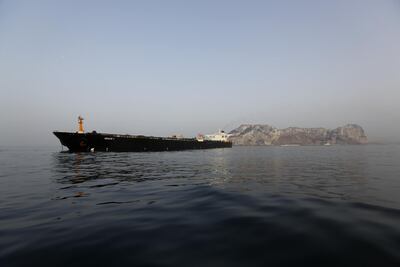Just days after Iranian Foreign Minister Mohammad Javad Zarif told his British counterpart Jeremy Hunt that Tehran wanted to reduce maritime tensions between the two countries, Iran captured a British vessel in the Gulf.
Despite Mr Zarif’s high profile, he may have been the wrong figure for Mr Hunt to contact in this case. The crisis is grounded in US sanctions and the fallout from the nuclear deal but also in Iran’s support for the Syrian regime, which is the domain of Iran’s Islamic Revolutionary Guard Corps.
The group, which answers to Supreme Leader Ayatollah Ali Khamenei rather than Tehran's elected government, was established to defend Iran and further the 1979 Islamic revolution. For the past eight years, this has included supervising Shiite militias fighting on behalf of President Bashar Al Assad in Syria in a conflict that has seen Damascus kill hundreds of thousands of its citizens.
On July 4, British Royal Marines seized the Iranian tanker Grace 1 off Gibraltar, saying the 2.1 million barrels of Iranian oil aboard was being transported to Syria in contravention of EU sanctions. On July 19, following earlier Iranian actions against shipping in the Strait of Hormuz, IRGC commandos seized the British-flagged tanker Stena Impero.
The confrontation between Iran and Britain is the latest example of the Western scramble to deal with predictable moves by Iran following US pressure on Tehran.
Having acted upon London’s inability to protect all British-linked shipping in the Straight of Hormuz, Iran looks set to exploit fissures between Britain and the EU, and between Washington and increasingly nominal European allies to strengthen its position in any negotiated outcome to the ongoing crisis with the US, and the new one with Britain.
The British seizure of Grace 1 was the first time a European country seriously challenged Iranian support for the Syrian regime since the start of the uprising against the Assad family rule in 2011. The amount of oil aboard is significant, equal to two-thirds of the entire daily output of a sizeable producer such as the UAE.
That the IRGC would respond by detaining a British vessel was hardly unforeseeable, given the direct challenge by London to Iranian supremacy in Syria, partly contingent on Tehran’s crucial aid to President Bashar Al Assad, and that the group had warned Britain to expect reciprocity.
Shouts of "Allah Wa Akbar," or God is greater, could be heard on official Iranian videos of the operation, as IRGC commandos intercepted on Friday via helicopter and gunboats the Stena Impero, which was sailing towards the Saudi port of Jubail.

The seizure followed an earlier attempt on July 11, in which Britain said one of its frigates foiled an attempt by Iranian boats to stop and divert the British Heritage, a BP operated tanker that was passing through the Strait of Hormuz.
The fiercely ideological composition of the IRGC may have been lost on Mr Hunt, who said he was disappointed by Mr Zarif. His disappointment could extend to Britain’s European allies, who have not been exactly supportive of Britain during the crisis.
European diplomatic sources say that with the possible exception of France, there is little enthusiasm on the continent to participate in a European naval formation proposed by London to protect shipping through the Strait of Hormuz.
It is not the first time that Iran’s foes have been caught unprepared by a predictable action. European sources said Iranian officials signalled that tankers in the Gulf would be a target because of regional support for US sanctions on Tehran, well before the first sabotage of an oil tanker off the Fujairah coast in May this year.
Britain may have relied too much on having open channels with Mr Zarif, widely seen in diplomatic circles – except perhaps in Britain – as having little say on the issue of Syria. In February, Mr Zarif briefly resigned after being kept in the dark on a visit by Mr Al Assad to Tehran, the first since the start of the civil war.
Iran's confidence may have received a boost by the EU, which has refrained from supporting Britain's impoundment of the Grace 1, despite its apparent flaunting of EU sanctions against the Syrian regime. US Secretary of State Mike Pompeo said after the Iranian retaliation that Britain must fend for itself, in departure from Washington's usual position of portraying itself as a dependable ally of Britain.
The EU imposed sanctions on the Syrian regime in 2011, shortly after the outbreak of the uprising, and condemned its siege warfare and forced population transfers, but practiced a de facto policy of no-objection to Iran’s role in Syria, despite the waves of refugees to Europe.
The sanctions had been toothless in curbing Iranian support for the Mr Assad, until Britain seized the Grace 1. But Iran has sympathetic ears in Europe, most notably in Germany. With the rest of Europe little bothered by Iran's support for the Damascus regime, despite verbal condemnation of its policies, Britain will find it difficult to resolve this row in any way that would undermine Tehran.
Iran has not admitted outright that the vessel’s oil was destined for the Syrian regime, thus opening the possibility it could comply with an initial demand by Britain that the tanker not sail to Syria in return for its release.
But that could prove to be a temporary restraint on Iran, with multi-layered differences between Britain, the EU and the US undermining any action that could effectively counter Iranian interests. If the next tanker carrying Iranian crude to help fuel the war machine of the Syrian regime comes near the British Royal Marines, London will likely think twice before impounding it.


